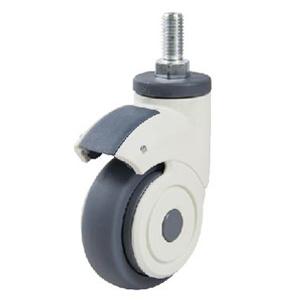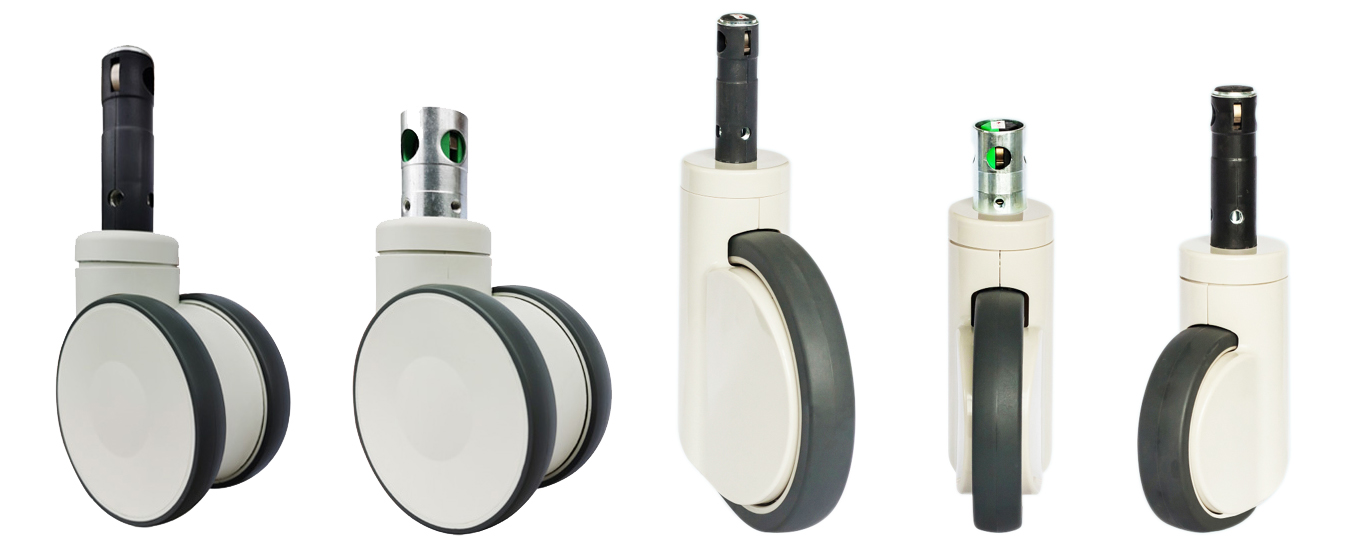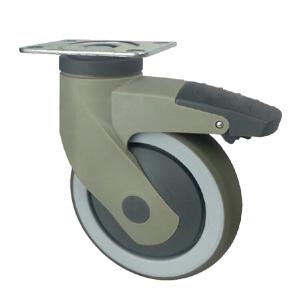Medical Cart Casters To Eliminate Noise
The most frequent complain voiced by hospital patients nowadays concerns not the food itself, but rather the medical carts on which it is delivered.
The reason for this is that hospital food carts tend to be noisy, which patients can hear well before they come into view. The carts emit a distinct sound, characterized by the clattering of casters, the rumbling of hard wheels rolling on hospital floors, the grinding of metal axles against plastic wheel cores, and the squeaking of caster components that require lubrication.
Hospital carts, whether they are medical carts, food service delivery carts or flatbed carts, are notorious for their noise. And noise, according to Hospital Consumer Assessment of Healthcare Providers and Systems (HCAHPS), is the top complaint among hospital patients, staff and visitors.
Shop Quiet Medical Casters Here
xxxx
Hospital noise levels sometimes hit 80 decibels—double the recommended level for overnight noise. Just to give you some context, a chainsaw produces around 80 decibels of noise.

Dangerous Decibels
The noise levels in numerous hospitals have now reached a point where they surpass international recommendations, as determined by the World Health Organization (WHO). According to the WHO, the average sound levels in hospitals should not exceed 35 decibels, with a maximum of 40 decibels during the night.
But today, hospital noise levels sometimes hit 80 decibels—double the recommended level for overnight noise. Just to give you some context, a chainsaw produces around 80 decibels of noise.
It is evident that hospital noise is a significant issue for patients, as demonstrated by the low ratings that many patients give on HCAHPS surveys. These surveys are distributed to a random selection of patients within six weeks of their discharge from the hospital. Hospitals are required to collect a minimum of 300 surveys per year, which must be collected throughout each month.
The HCAHPS survey consists of 27 questions about critical aspects of the hospital experience. One of those questions is explicitly about noise. It asks, “During this hospital stay, how often was the area around your room quiet at night?” patients can answer “Never,” “Sometimes,” “Usually” or “Always.” Too many patients are answering “Never” and “Sometimes.” And the culprit in many cases is noisy casters on hospital carts.
However, the issue of excessive hospital noise goes beyond being a mere annoyance for patients, as it can also have a negative impact on their outcomes. In fact, a study conducted jointly by King’s College London and the University of the Arts London found that patients in coronary care units who were treated during periods of high noise levels had a greater likelihood of being re-hospitalized than those who were treated during quieter periods. This highlights the importance of addressing the issue of hospital noise to improve patient outcomes.
Caster Connection Stacked FINAL FILES LB 72dpi FOR LINKEDIN

The Cause of Noisy medical carts
Medical carts are noisy because they typically feature commodity casters. Cart manufacturers equip their carts with cheap casters to keep the purchase price down, but someone pays the price for these cheap casters, and that someone is the patient who must endure the noise they make.
The commodity casters on medical carts are noisy for three main reasons:
Wrong Tread Material: The rubber is too hard. It cannot absorb and distribute impact, making the wheels noisy when rolling.
Loose Raceways: Casters with loose raceways produce the chatter noise commonly associated with casters.
No Bearings: Most hospital carts, IV poles and mobile workstations feature casters that don’t have any bearings. Instead, the metal axle grinds on the plastic core of the wheel, producing noise.

What Hospitals are Doing to Quiet Their Medical Carts
Hospitals are replacing the commodity casters on their carts with casters that are engineered and manufactured to meet the exacting requirements of hospitals and healthcare facilities.
These casters feature wheels made from high-quality polyurethane, which stores and exudes energy to reduce noise-causing vibrations, and deliver a smooth and quiet ride. These casters also feature sealed bearings that distribute loads, reduce friction and reduce noise.
Hospitals usually observe a significant improvement when they replace their noisy commodity casters. The most apparent change is the reduction in noise levels, which promptly translates into a better patient experience. Patients experience less stress and agitation, and they are able to enjoy a higher quality of sleep.
Better casters also eventually improve HCAHPS scores, as increasing numbers of patients check the boxes for “Usually” or “Always” when answering the survey question about how often the area around their room was quiet at night.
And the benefits of quieter casters also go home with patients, with increasing numbers of them experiencing lower incidence of re-hospitalization compared with patients who are treated in noisier facilities.
How to Take Action
While hospital administrators may not typically devote much of their day to considering the topic of casters, many patients within their facilities do. Hospital casters are known to produce an excessive amount of noise, which can lead to frustrated patients. However, more and more hospitals and healthcare facilities are taking steps to improve patient experiences and outcomes by swapping out the noisy, generic casters on their medical carts for those that are specifically designed, engineered, and manufactured to operate quietly within a hospital environment.
If your hospital or healthcare facility has a problem with noisy casters, read our white paper, Wheels of Fortune: How Improving the Casters in Your Healthcare Facility Reduces Noise, Enhances Patient Satisfaction, and Drives Ergonomics. Or, if you are ready to talk solutions.
To order your central-locking brake system or to have any questions answered, please click here.
Product Tag:central locking casters

Tested Products to Enhance the Medical Industry
The medical sector has distinctive requirements that are not commonly found in other industries. Patients are the customers, and it is essential to have casters and wheels that offer comfort to them while instilling confidence in the employees. Anti-microbial wheels, quiet and ergonomic casters, and floor-friendly wheels are some of the ideal solutions that meet these needs.
We offer different products for different problems, and work with you to find you the best solutions for your needs.
Let Caster Connection solve your mobility problems for you, so you can get back to doing what you do best.
CC Apex: Making Hospital Carts Quieter and More Ergonomic
It’s important to tailor your medical environment to help the patient feel more comfortable. It can be easy to forget how a seemingly small issue, like a noisy caster or wheel, can impact the patient in a negative way.
Before engaging with HuanXin medical caster, a large hospital in Ohio received numerous complaints from patients and staff about the excessive noise generated by their maintenance carts. Additionally, the wheels were challenging to maneuver, causing further inconvenience. In an attempt to address the issue, the hospital replaced the original wheels with harder ones, hoping to reduce the force required to move the carts. However, this resulted in even louder noise levels, leading to further complaints.
A committee at the hospital created specifically to reduce noise throughout the facility contacted Caster Connection for help. We suggested a trial run of our CC Apex wheel, which they used on a few carts. The maintenance team gave “rave reviews” about the CC Apex, commenting on how quiet and easy to use it was. Even patients noticed the noise difference.
Gray CC Apex
Soon after the wheel’s introduction, the hospital contacted Caster Connection again. This time they replaced all of the carts in the hospital with the CC Apex, and continue to be happy customers.
Casters with Neoprene Wheels: Protecting Hospital Floors
In addition to being noise-free, hospitals must maintain high standards of cleanliness. The wrong type of wheel can leave unsightly streaks on floors and walls, while also collecting dirt and debris that can be spread throughout the facility. This can negatively impact the appearance and hygiene of the hospital.
One maintenance team found that the nylon wheels on their rolling chairs and tables were damaging floors and leaving them with streaks. The maintenance team then had to spend more time and effort waxing and cleaning the floors, and began contacting multiple caster companies for a solution. They were almost out of luck until Caster Connection stepped in to help.
Neoprene caster
A Regional Sales Manager from Huanxin Medical Caster collaborated with the hospital and suggested replacing their existing wheels with the Medcaster Neoprene wheel, which is designed specifically for hospital use. After just one month of testing, the maintenance team reported impressive results. They were able to save over 40 hours of labor that would have been spent on floor waxing, and over 20 gallons of wax. This demonstrates the effectiveness of using the appropriate type of wheel for hospital applications.
Not only did this end the original problem of damaged floors, but the savings on wax allowed the hospital to outfit all of their tables and chairs with the Neoprene wheel.
Over 2 years later the hospital continues to be a repeat customer. Said the maintenance manager, “We Call Caster Connection now for any of our [caster and wheel] needs and will for the future.”
Shop our entire collection of medical equipment casters.

